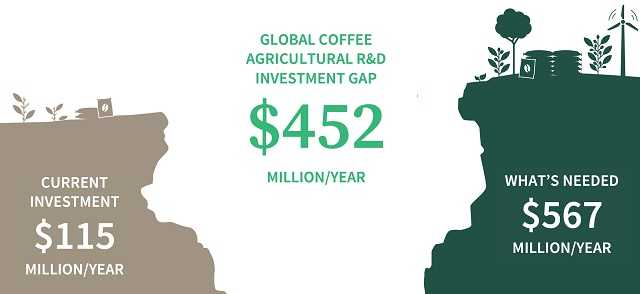PORTLAND OR, USA – According to research from the World Coffee Research (WCR) published yesterday, over the coming decade the world needs to invest $452 million more per year in coffee agriculture R&D to ensure adequate supplies of coffee in the face of rising demand and climate change.
The white paper “Coffee’s innovation crisis – Determining the size of the agricultural R&D investment gap for coffee amid growing consumer demand and the climate crisis” by Dr. Mywish K. Maredia and José Maria Martinez of Michigan State University’s Department of Agricultural, Food, and Resource Economics develops an economic model in order to provide a rational basis for understanding the true size of coffee’s agricultural R&D gap in the face of rising demand and climate change.
Most of the investment should focus on increasing productivity in Africa and Latin America, which have faced severe historic underinvestment.
Without added investment, the coffee industry faces severe instability and loss, including accelerated consolidation of supply to the world’s top suppliers, Brazil, Vietnam, and Colombia.
The paper’s authors conclude that current levels of investment in agricultural R&D for coffee are “shockingly low” given the global value of the commodity.
They estimate that current total agricultural R&D investments in coffee for the global south total is about US $115 million (in constant 2020 US dollars). This amounts to only 1.8% of total investments made in agriculture in the 45 countries studied, despite the fact that coffee accounts for 4.8% of agricultural output.
Coffee’s current level of investment in agricultural R&D is shockingly low. “In our estimates, 90% of these investments are made by the public sector and 10% are made by the private sector” say the authors.
As a general rule, R&D investments to different commodities should be allocated proportionally to their market value (Fuglie, 2022). The total value of green coffee makes up about 4.8% the of total value of agricultural output in the 45 countries included in this analysis. Coffee should therefore make up a similar percentage of agriculture sector investments in these countries—yet today, the investment amount is a mere 1.8%.
“This scale of underinvestment cannot continue if the world wants to continue drinking its favorite beverage,” says economist Mywish Maredia, lead author of the study.
In the paper she writes, “Increasing global investments in coffee R&D to accelerate innovations across multiple countries can help reverse this trend and support the coffee sector to keep up with growing consumer demand and respond to the challenges of climate change and poverty, while avoiding further consolidation of production.”
Agricultural innovation can encompass everything from the development of new plant varieties, to cultural/management practices (agronomy, land and water resources, irrigation, soil fertility, pest control), to farm operations (planting, weeding, harvesting, on-farm or near-farm cherry processing) and marketing.
In the same way that the world cannot reach its global carbon emissions targets without innovating new energy production and transportation approaches, agricultural innovations are also required to respond to the climate crisis and achieve the Sustainable Development Goals, avoid deforestation, mitigate climate emissions from agriculture, and provide livelihood improvements to farmers.
“I think coffee consumers would be excited to know that securing the future of coffee will cost less than half a penny for every $1 of coffee they consume,” says Dr. Jennifer “Vern” Long of World Coffee Research, which commissioned the study. “While mobilizing increased investment is urgent, it’s far from overwhelming. We applaud the many companies globally already investing coffee R&D through World Coffee Research.”










